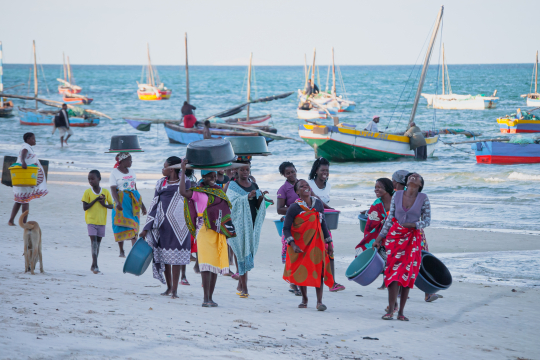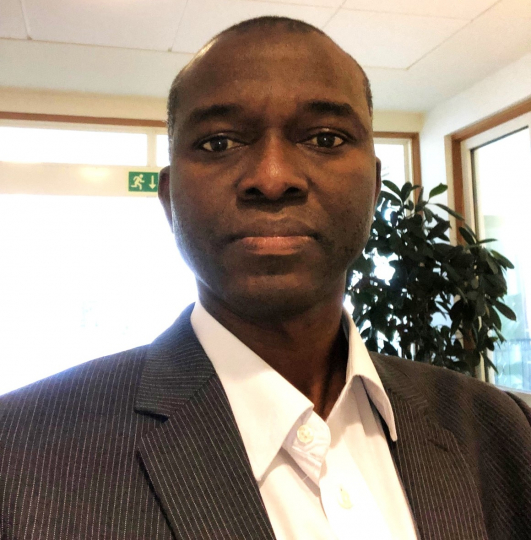EfD Ghana and EfD Nigeria collaborate in a joint project that transfers knowledge and best practices from Ghana to Nigeria, leading to the development and implementation of Nigeria’s first fisheries management plan. The plan will support a more effective data-driven regulation of Nigeria’s fishing efforts.
The fisheries sector plays an important role in the Nigerian economy by meeting the protein demand of the growing population, providing employment along the value chain, particularly in rural and coastal communities, with aquaculture as an emerging sector, and contributing to foreign exchange earnings through exports of fish and fishery products. However, Nigeria struggles with issues it shares with neighboring countries.
“The fisheries sector in Nigeria has many problems, such as overfishing, weak and outdated legal framework, poor management, and monitoring, among others,” says Nnaemeka Chukwuone, EfD Nigeria’s Center Director.
EfD partnered with government
EfD Nigeria has studied those problems for a long time. Researchers from the center shared, for instance, their research findings regarding the fisheries sector with stakeholders in January 2022 which resulted in a communique requesting Nigeria's National Assembly to review the country's fisheries law.
In November of that year, EfD Nigeria partnered with government agencies and other stakeholders in Nigeria's fisheries and aquaculture sector to review the Nigeria Sea Fisheries Act of 1992. A document containing recommendations on what should form the new law was produced after a two-day workshop organized by EfD Nigeria, in collaboration with the Federal Ministry of Agriculture and Rural Development and the Nigerian Trawlers Owners Association.
“Implementing a fisheries management plan is important for ensuring the sustainability of fish stocks, supporting local economies, and promoting food security,” notes Wellington Omoragbon, Director of the Department of Fisheries and Aquaculture.
Experiences from EfD Ghana
EfD aims to stimulate peer-learning and to take advantage of the knowledge and experiences acquiredaat the different centers.
A project, titled Enhancing fisheries policy initiatives in Nigeria based on EfD Ghana experiences: The blueprint for developing Fisheries Management Plan (FMP) for Nigeria was initiated in 2023. It’s motivated by the need to address the challenges posed by open-access fisheries. Drawing on EfD Ghana's successful experiences in designing and implementing a fisheries management plan, the project aims to give Nigerian policymakers, researchers, and stakeholders from Nigeria’s Federal Department of Fisheries and Aquaculture and Federal Ministry of Agriculture and Food Security the necessary tools and insights for effective fisheries management.
“EfD has contributed to the capacity development of staff in this regard. The training has equipped our staff with knowledge on how to estimate the Maximum Sustainable Yield of Marine Resources for developing a management plan, using Ghana as a case study,” says Wellington Omoragbon.
Key activities within the project include in-depth interactions between researchers and policymakers from both countries, hands-on training, and peer learning on simple bioeconomic analysis. One of the primary deliverables is formulating a fisheries management plan specifically tailored for small pelagic species in Nigeria. The plan is expected to play an important role in addressing the transboundary nature of fisheries and fostering cooperation among policymakers in the West African region.
“Given the transboundary nature of fisheries, problems like overfishing are shared with Ghana and other neighboring countries. We hope to develop a project to deal more with these issues across countries in the region,” says Nnaemeka Chukwuone.
The team has gathered the required data for a bioeconomic analysis and will start the analysis and the development of the plan in March 2024. There are many possible measures. What solutions will be included in the plan will depend on the outcome of the bioeconomic model.
“We aim to have a plan by April, after which we will hold a workshop to validate it, and hopefully, after that, the implementation will start. The Federal Department of Fisheries is working closely with us on this,” relates Nnaemeka Chukwuone.

